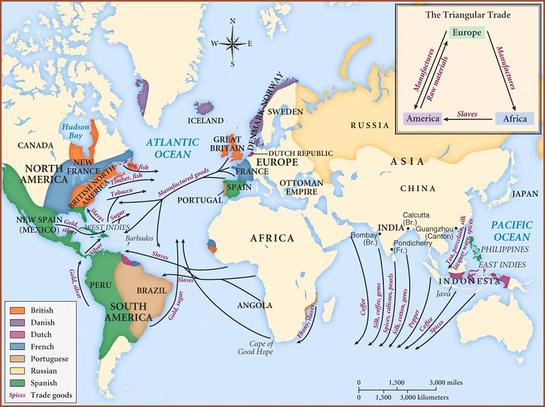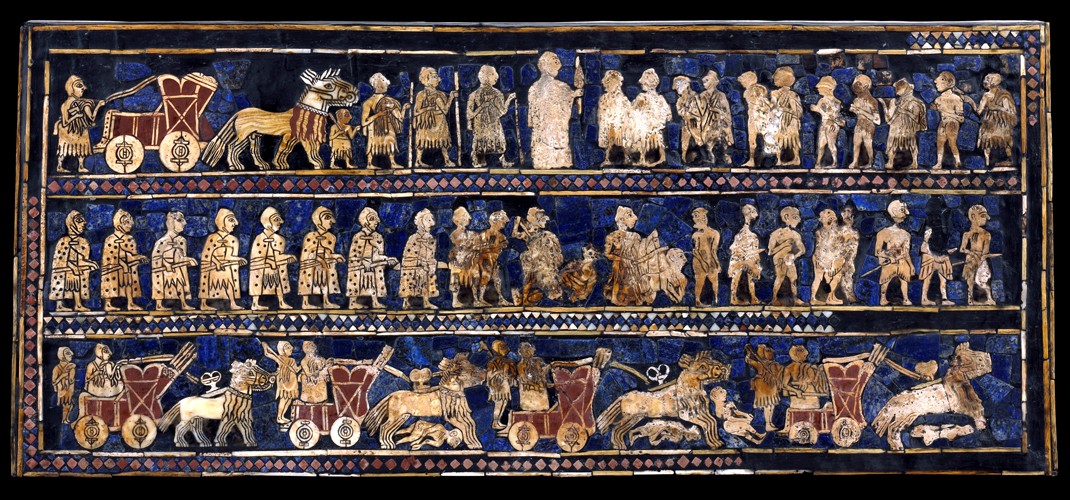For your review for the Unit Test on Period 5, you will need to select 10 thematic issues from the review list I provided. For each of your issues, I would like you to write a 2 sentence contextualization and then include specific illustrative examples.
SAMPLE:
1. Enlightenment ideas and revolution in the Atlantic World
The Enlightenment in Europe (18th century) grew out of the Scientific Revolution and applied the principles of the scientific method, as well as the concepts of rationality and progress, to the study of human society. Enlightenment ideals of progress and perfectibility - the notion that society and government cold be improved by rational human efforts - led to the idea of natural rights such as liberty, equality before the law, free trade, religious toleration, and republicanism (citizenship in a state based on popular sovereignty vs. monarchy). Enlightenment thinkers challenged established beliefs in the divine right of kings, mercantilism and aristocratic privilege, and church authority. These ideals spread rapidly through newspapers, pamphlets and books, across the Atlantic to the colonies of France, Spain, Britain, and Portugal and animated the American, French, Haitian and South American Revolutions. Enlightenment ideals were articulated in several founding documents from these revolutions ranging from The Declaration of Independence, to The Declaration of the Rights of Man to Simon Bolivar's Jamaica Letter and create a common intellectual language and culture for the Atlantic Revolutions.
Monday, December 31, 2018
Friday, December 21, 2018
BLIZZARD BAG 2

Happy Holidays and Merry WHAPmas everyone!
SILVER DBQ:
For today's Blizzard Bag assignment I would like you to prepare the document and grouping chart for our next DBQ. Over break I will have a special page on the blog dedicated to highlights from our last DBQ and tips for future essays. Please find the Silver DBQ documents HERE, the document analysis chart HERE, the grouping chart HERE, and the DBQ powerpoint I created for the last essay HERE.
DUE DATES:
Chapter 19 Notes and Study Guide (Wednesday 1/2)
Period 5 Review Materials (Friday 1/4)
Period 5 Unit Test (Monday 1/7)
Tuesday, November 27, 2018
Blizzard Bag Information

Mongolian Ice and Snow Festival
You know how we Blizz in WHAP? Like the MONGOLS. Yup. That's how we roll.
You have two components to your Blizzard Bag.
1. You each should have hard copies at home of the Mongols DBQ I handed out yesterday in class. Digital copies located HERE. Please fill out the document chart HERE - Attribute, Characteristics and Sourcing columns ONLY. This chart walks you through breaking down the DBQ documents individually, making note of various components and beginning the process of document analysis. We will work on grouping and thesis development together as a group. For more information on the different categories of analysis on the chart, check out the Powerpoint located HERE.
2. If you have internet or can use you phone (parental approval for data plan required) please travel to the Caribbean, to the site of "first contact" between the Eastern and Western Hemispheres (I know, I know, Vikings, Greenland!! But, bear with me, I'm going with the colonization narrative here), the island of Hispaniola. The video is linked on the Blizzard Bag page on the right of the blog along with a series of video questions.
Please let me know if you have any issues with links or need further clarification on the assignments. In the case of no power, just do your best. Work on the hard copies of the DBQ or see if you can plug along on the Early Modern Era Map - OR - finalize your Southernization questions that were due today.
Friday, November 23, 2018
Period 4 (1450 - 1750) AGENDA
AGENDA
DUE DATES:
Monday 11/26 - Study Guide Chapter 13, Quiz Chapter 13, Study Guide Chapter 14.
Tuesday 11/27 - Southernization Questions (My Notes on Southernization)
Friday 11/30 - Chapter 15 Study Guide, Chapter 15 Quiz
Monday 12/3 - Early Modern Era Map Due
Tuesday 12/4 - Early Modern Era Unit Test
COOL MAPS TO HELP WITH YOUR MAP


Friday, November 16, 2018
Period 5 (1450 - 1750) - Agenda

Think you have WHAP under control, then along comes Period 5.
STAY TUNED FOR AGENDA
I am working on laying out the rest of the course up until Final Exams. I will have a due date schedule that covers Period 5 (chapters 13,14,15) posted here by the end of the day today. But until then, here are some planning tips:
The 90 minutes in class we missed today should cover your Chapter 13 Quiz AND starting Southernization.
Just a word to the wise on this reading. It is challenging. It is college-level history. It has been used (excerpted) on many AP World exams over the years, so it is worth your time. It is also an excellent review of the Indian Ocean Trade Network. Based on the Midterms, I think is is well worth our time as a class to shore up some of details related to this important trade network. Here is how I would approach the reading:
1. Highlight and make notes in the margins as you go. (Patrick - just highlight SOME parts :-)
2. Underline key technologies, goods and civilizations. This is content you can use on the Early Modern Mapapalooza for IOTN.
2. Underline key technologies, goods and civilizations. This is content you can use on the Early Modern Mapapalooza for IOTN.
3. Try to identify the 1-2 sentences that contain Shaffer's thesis. Circle them.
4. Then (using some other system of demarcation) make note of key evidence or reasoning that supports the thesis.
* REMINDER- know those AP regions (aka. South Asia = modern territories of Afghanistan, Bangladesh, Bhutan, Maldives, Nepal, India, Pakistan and Sri Lanka)
Friday, October 19, 2018
Monday, October 15, 2018
James Foley Legacy Project
WHAP Movie Night: Thursday October 18th - Permission Slip
This is a tough topic, a painful story, but one that I sincerely believe emphasizes the resilience and goodness of humanity and provokes thoughtful discussion around the ideal of moral courage.
Below I have linked a series of readings that we will be reviewing in class.
Vox Article Syrian Civil War - In Class Notes with a focus on Continuity and Change over Time
James Foley Articles - In the first person
Thursday, October 11, 2018
Wednesday, October 10, 2018
Monday, October 8, 2018
Monday, September 24, 2018
Classical Era Africa

Terra Cotta Statue from Jenne Jeno. Artistic tradition of the Niger Valley region. Expresses complementary roles of men and women. Gender parallelism.
Hatshepsut
Queen Candace of Meroe
Candace Video
MAP
Blank Map of Africa
Tuesday, September 18, 2018
A History of the World in 100 Objects
State Building in the Classical Era
Each group will be assigned one of these two objects to study. Your task as a group is to listen to the podcast and follow along on the paper copy. For your artifact, create a sample Key Term that includes Date Location Civilization Description and significance. We will specifically be focusing on the Historical Thinking Skill of contextualization. Think about how your artifact fits into the larger regional and global themes that we have emphasize for this time period. Good Luck!
Head of Augustus
Head of Alexander
Each group will be assigned one of these two objects to study. Your task as a group is to listen to the podcast and follow along on the paper copy. For your artifact, create a sample Key Term that includes Date Location Civilization Description and significance. We will specifically be focusing on the Historical Thinking Skill of contextualization. Think about how your artifact fits into the larger regional and global themes that we have emphasize for this time period. Good Luck!
Head of Augustus
Head of Alexander
Tuesday, September 11, 2018
Story of India
Story of India Part 2: The Power of Ideas
Please watch the video and be prepared to discuss it in class on Wednesday.
In-Class Discussion Questions: participation grade
1. What role does an untouchable caste member play in the larger caste system in India?
2. In the 5th Century B.C.E what belief systems began to develop around the world?
3. What were the Buddhas last words and what do they reveal about Buddhist philosophy?
4. At the time of the Buddha, what key global events were unfolding and how did they impact India?
5. Describe the attire of Alexander's army. What was significant about their clothing?
6. Who was the young Indian ruler influenced by Alexander and his empire?
7. How did the Greeks describe the Mauryans? List some of the curiosities of the Mauryan Empire mentioned by the Greeks.
8. Who was Ashoka and why is he a significant figure in Indian history?
9. What are some of the most important edicts from Ashoka?
The Story of India Website
Use this interactive timeline to find information on the Vedic Religion/Rig Veda, as well as a video clip on the discovery of Harappa. Each episode is cataloged on the left and has a corresponding interactive timeline. LOTS of rich information here to help with the key terms from your study guide.
Note: Hinduism is a complex belief system. It has a variety of sacred texts, the oldest of which being the vedas, and began in Period 1, with the earliest hymns of the Rig Veda composed between 1500-1000 BCE
Monday, September 10, 2018
Period 2 - Key Terms Study Guide
The link to the Key Terms Study Guide for Period 2 is HERE.
Please use this copy as I amended the list I handed out in class. It is digital so you can increase the spacing if you choose BUT, the copy you hand in to me should be HANDWRITTEN. Research shows that handwriting helps with information retention AND all writing on the AP Exam is by hand, so we need to get those fingers in shape!!
You can do this (BELOW) when we do chapter notes.

For each Key Term - please make sure to include the following information:
DATE
LOCATION
CIVILIZATION
DESCRIPTION
SIGNIFICANCE
In past classes we have used the mnemonic device: Dumb Llamas Can't Dance Samba to remember the essential components to an outstanding definition.
Please use this copy as I amended the list I handed out in class. It is digital so you can increase the spacing if you choose BUT, the copy you hand in to me should be HANDWRITTEN. Research shows that handwriting helps with information retention AND all writing on the AP Exam is by hand, so we need to get those fingers in shape!!
You can do this (BELOW) when we do chapter notes.

For each Key Term - please make sure to include the following information:
DATE
LOCATION
CIVILIZATION
DESCRIPTION
SIGNIFICANCE
In past classes we have used the mnemonic device: Dumb Llamas Can't Dance Samba to remember the essential components to an outstanding definition.
Tuesday, September 4, 2018
Thursday, June 21, 2018
Subscribe to:
Comments (Atom)




